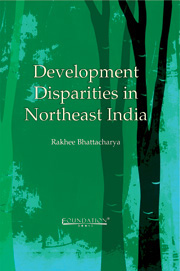Book contents
- Frontmatter
- Contents
- Preface
- List of Figures
- List of Tables
- 1 Challenges of Disparity in the Northeast
- 2 Dimensions of Disparity in the Northeast
- 3 Facets of Government Finance in the Northeast
- 4 Economy of Insurgency in the Northeast
- 5 Energy Interplay in the Northeast
- 6 Development Initiatives in the Northeast
- Index
1 - Challenges of Disparity in the Northeast
Published online by Cambridge University Press: 05 June 2012
- Frontmatter
- Contents
- Preface
- List of Figures
- List of Tables
- 1 Challenges of Disparity in the Northeast
- 2 Dimensions of Disparity in the Northeast
- 3 Facets of Government Finance in the Northeast
- 4 Economy of Insurgency in the Northeast
- 5 Energy Interplay in the Northeast
- 6 Development Initiatives in the Northeast
- Index
Summary
Development and Disparity Conflict
The history of economic development has witnessed many inevitable and irreversible processes. These have emerged in various development theories. In the simplest term, one can perceive development as a paradigm of change and transition that takes place along a continuum of the ever changing historical and sociopolitical-economic ethos in the life of a nation or a society. Chasing better living in a better world compared to the past, in which the quality of life is transformed en masse is a way to define development. Development, therefore, is expected to transform material well-being and accelerate economic growth thereby creating space and opportunities for people. A modern identity is acquired through professional attainments and avenues. If one looks at the major ideas that have evolved around ‘development’ in the last fifty years or so, one finds that these ideas mostly evolved within the western framework. The emphasis of this framework of development was on capital formation, industrialization and the growth of national income. Thus ‘neoclassical production function’, a celebrated work of Robert Solow, was used during this period as a popular growth model. This model generalized the relationship among labour, capital, technology and output. Western ideas of development like income growth and capital formation were keys to the success of economic modernization and progress in the world for decades. Thinkers have realized that such growth alone led to concentration of wealth and ignored equity.
- Type
- Chapter
- Information
- Development Disparities in Northeast India , pp. 1 - 23Publisher: Foundation BooksPrint publication year: 2011

